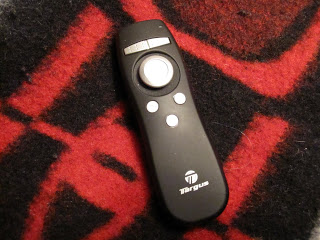 |
| Targus Wireless Presenter and Emacs Volume Control |
Finding wireless input devices (for controlling the stereo) that are
1) not too ugly and
2) works reliably and
3) has a range over a few meters
isn’t trivial. I’ve experimented with a few thingamabobs, and one device I’m pretty satisfied with is the Targus … er… I can’t find any model name here. AMP02EU? Anyway, it’s a “wireless presenter” (with a laser pointer, so I could entertain a cat if I had a cat, but I don’t *sob*), so, of course, it isn’t really geared towards music playing. But since, these days, all input devices show up as input devices in Linux, you can use it for whatever you want, with a bit of configuration.
The first thing to do is to put the following in /etc/udev/rules.d/90-itron.rules. It has to be “late” in the udev chain so that other rules don’t overwrite the name we want.
KERNEL==”event*”, BUS==”usb”, SYSFS{idVendor}==”195d”, SYSFS{idProduct}==”7777″, MODE=”0666″, NAME=”input/itron%n”
I chose the name “itron” since that’s what lsusb claims that this device is:
rocket-sam:/etc# lsusb
Bus 002 Device 018: ID 195d:7777 Itron Technology iONE Scorpius wireless keyboard
Now that we know where the device will show up (i.e., /dev/input/itron*), we can route events to the commands we want to execute. I googled around for a while before deciding to use evrouter, which gives us pretty simple access to all events.
“Itron Powerful Receiver” “” any rel/1/1 “Shell/emacsclient –server-file=rocket-sam –eval ‘(jukebox-decrease-volume)'”
“Itron Powerful Receiver” “” any rel/1/-1 “Shell/emacsclient –server-file=rocket-sam –eval ‘(jukebox-increase-volume)'”
“Itron Powerful Receiver” “” any key/272 “Shell/emacsclient –server-file=rocket-sam –eval ‘(jukebox-pause)'”
“Itron Powerful Receiver” “” any key/104 “Shell/lights 0”
“Itron Powerful Receiver” “” any key/109 “Shell/lights 1”
The first string is the name of the device (yes, that’s what it calls itself. How masterful). “rel” is the mouse. “key” is, er, a key.
So this decreases volume when the mouse goes down, increases when the mouse goes up, pauses the music when I press the big button down, and switches the lights in the room off/on on two of the other buttons.
Which still leaves me with more unused buttons, but I haven’t found a use for them yet.
Then start the event routing in a startup script like so:
(The first “rm” is needed because evrouter doesn’t seem to clean up after itself always…)
The only minor problem I now have is that although evrouter picks up the events, they still get passed on to X. So when I increase the volume, the mouse cursor goes upwards. I haven’t bothered trying to investigate how to make X ignore certain input units, but if anyone has a pointer to a conf example, please leave a note in the comments.
I forgot to mention that evrouter needed a patch to actually react to normal mouse events. I've put the patch (and the fork) up on github.
Did you ever figure out how to not have the events passed on to the X server? I have exactly the same setup, using evrouter, and I also don't want the keypresses to be passed on to the active window.
No, I never figured out how to do that directly. But I did figure out how to make the X server ignore the device completely, so that they are only picked up by the evrouter program, and doesn't hit the X server at all.
Which isn't a very satisfying solution, because you sometimes want to only “intercept” certain events, and not block the entire device.